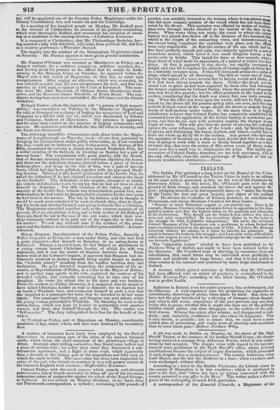Mr. Feargus O ' Connor was arrested at Manchester on Friday, on
a Judge's warrant, for a seditious conspiracy, seditious speeches, &c. ; and having given his promise to the officer that he would be forth- coming at the Borough Court on Saturday, he appeared before the Mayor and a full 'bench of Magistrates on that day, to enter into recognizances. After urging an objection, which was overruled, lie was ordered to enter into his own recognizance for 300/., and find two sureties in 1507. each, to appear at the Court at Liverpool. The sure- ties were Mr. Abel Heywood, of Oldham Street, Manchester, book- seller, and the Reverend James Schofield, of Every Street. The con- ditions having been read over and ratified, Mr. O'Connor and his friends withdrew.
Richard Barlow, whom the reporters call "a person of high respect- ability," was committed on Tuesday by the Manchester Magistrates, for trial at Liverpool on a charge of forging the acceptance of Leaf and Company to a bill for 492/. 13s. 1(7., which was discounted by Scholes and Company, bankers of Manchester. The prisoner, it appeared, had for some time carried on the practice of forging acceptances with success. He omitted to provide funds for this bill when at maturity, and the fraud was discovered.
The following incredible circumstance took place before the Magis- trates of Loughborough on Thursday week; we are thus particular in bringing the circumstances under public observation, as, if not vouched for they would not be believed by any living person. Mr. Barnes, of Six Hills, summoned his servant, a young man named Frederick Pick, for a wilful violation of the Sabbath, in cleaning on Sunday last a pair of lace-up boots! The complainant with great gravity told the Bench, that on Sunday morning he went into the outhouse adjoining his house, and there saw the defendant cleaning himself before a piece of broken iooking-glass ; and lying by the side of him, was a pair of lace-up boots which had just been polished, together with the just-used black- ing-brushes. Shocked at this horrid profimation of the Lord's Day, he asked the defendant if he had violated his orders and cleaned the boots on the Sabbath ? The defendant, to his surprise, attempted to justify his unholy and disobedient act, by saying that he had not time to clean himself on Saturday. For this violation of his orders, and of the sanctity of the Lord's Day, witness was determined to punish him, not- withstanding he had borne an irreproachable character for the two years he had been in his service. The lad, in his defence, said he thought it would be much more criminal if he went to church dirty, than in clean- ing his boots and shavinglimself, and going to church like a Christian. The Magistretes consulted together, and, to the extreme surprise of all present, lifter an admonition as long and es holy as that of the Bishop of Grenada, fined the lad in -the sum of 40s. and costs ; which their wor • ships humanely ordered to be paid out of the wages due to him from his master ! We ask any rational man if the conduct of the prose- cutor and the Justices is not calculated to effect great mischief.--Leicester Chronicle.
Hiram Simpson, Superintendent of the Bolton Police, formerly a Police Inspector at Liverpool—a man under thirty, and who had held a good character—shot himself on Saturday, in an eating-house at Liverpool. Though a married man, he had formed an attachment to a young woman named Christiana Leader, of which his wife was cognizant, and it was the source of disputes between them. From letters read at the Coroner's inquest, it appeared that Simpson had de- liberately resolved to destroy himself, being unable longer to endure the "horrible misery" resulting from the conflict between duty and inclination. He gave direction respecting the settlement of his ac- counts, as Superintendent of Police, in a letter to the Mayor of Bolton ; and in another long epistle to his wife, explained the motives of his intended suicide, and earnestly entreating her to take care of his daughter. He wrote his adieus also to his sister and two brothers. From his conduct on Friday afternoon, it is suspected that he meant to have killed Christiana Leader as well as himself ; for he hurried her on board a Woodside boat, and conducted himself in such a way that she imparted to a passenger her fears that he intended to do her some injury. The passenger interfered, and Simpson was sent ashore, while the young woman proceeded to Woodside. On Saturday he went to the eating, house, which was kept by Leader in partnership with another woman, and there shot himself through the ribs. The verdict was "Self-murder." The Jury relinquished their fees for the benefit of the 'widow.
At Watford on Friday, and at Dagenham on Monday, considerable quantities of hay, straw, wheat, and oats were destroyed by incendiary fires.


























 Previous page
Previous page